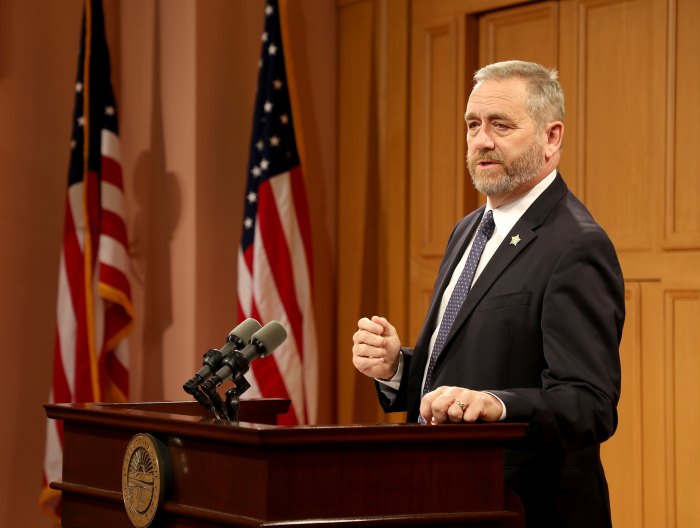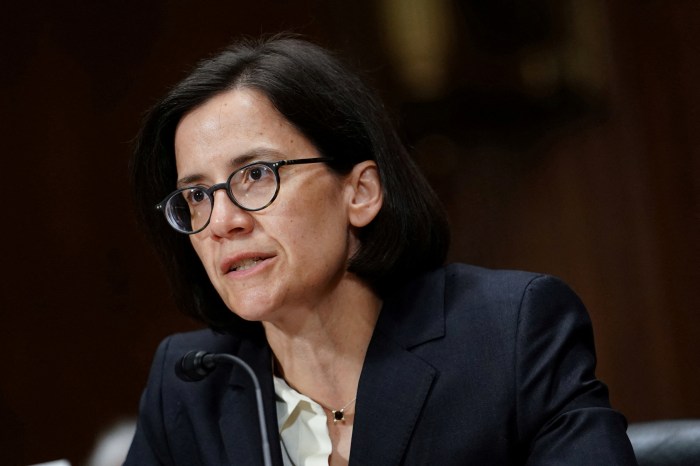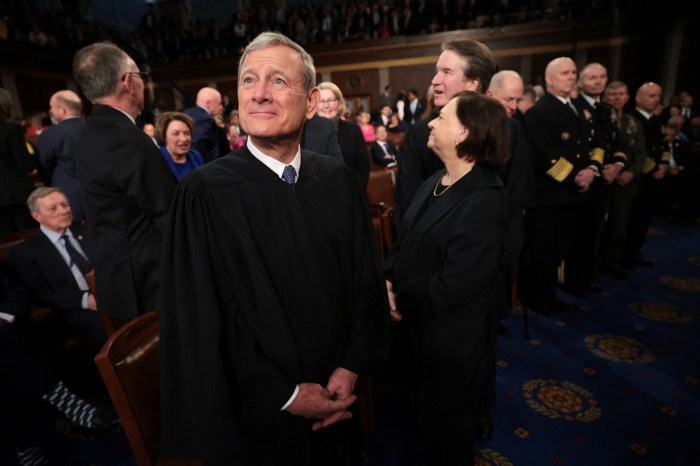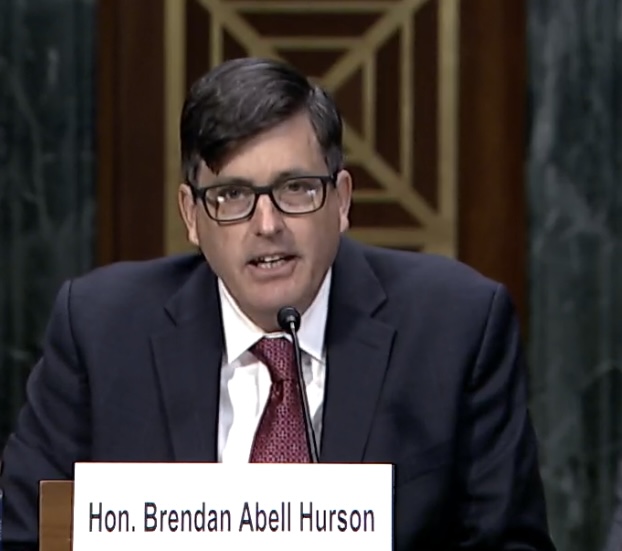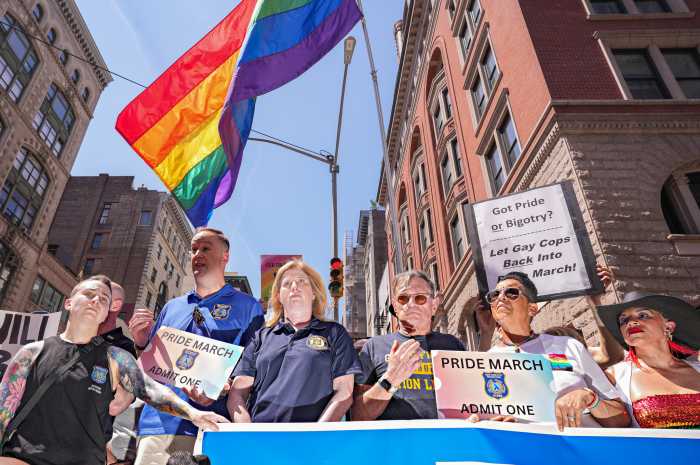The Pride Agenda’s Christopher Argyros testifies at an October 24 state legislative hearing on GENDA. | GAY CITY NEWS
At an October 24 hearing on the proposed New York State Gender Expression Non-Discrimination Act (GENDA), Causten Wollerman, a field organizer with the National Gay and Lesbian Task Force, put the finest point on the issue, saying, “This bill will save lives.”
The measure, stalled by inaction in the State Senate for the past decade, would amend New York human rights law to extend the nondiscrimination protections –– in employment, housing, public accommodations, and access to credit –– enjoyed since 2002 by the gay and lesbian community to transgender and other gender-nonconforming New Yorkers. It would also amend the state hate crimes law to add enhanced penalties for crimes motivated by perceived or actual gender identity and expression.
The hearing, held in a State Senate hearing room at 250 Broadway downtown and chaired by Senator Daniel Squadron and Assemblyman Dick Gottfried, Manhattan Democrats who are the measure’s lead sponsors, drew roughly a dozen and a half witnesses, who echoed Wollerman’s assessment of the need for GENDA, pushed back against concerns raised by its opponents, and described it as a tool for improving law enforcement.
Wollerman, citing statistics from New York compiled in connection with the Task Force’s nationwide study of discrimination against the transgender community, stated that roughly three-quarters of its sample in this state had experienced harassment on the job, 20 percent had been fired, almost one in five reported being homeless, and the incidence of living below the poverty line was five times the level for the general public.
Noah Lewis, an attorney at the Transgender Legal Defense and Education Fund, testified that four in ten members of the transgender community have attempted suicide at least once in their lives, as compared to1.6 percent for the population as a whole.
Christopher Argyros, the transgender rights organizer at the Empire State Pride Agenda, noted that two out of every three transgender New Yorkers have been homeless at one time or another and that nearly 30 percent have been the victims of serious physical or sexual assault.
But Argyros also testified to the “patchwork” nature of transgender civil rights protections. Sixteen states and the District of Columbia have GENDA-type laws, as do the cities of Albany, Binghamton, Buffalo, Ithaca, New York, and Rochester and Westchester, Suffolk, and Tompkins Counties. Nearly 60 percent of New Yorkers live in localities with transgender rights laws –– meaning more than 40 percent do not. A resident of Suffolk County who works in nearby Nassau County, he noted, would have protections against housing discrimination but not against mistreatment on the job.
Nearly 80 percent of New Yorkers support the concept of GENDA, Argyros said, and 43 percent of Fortune 500 companies, many headquartered in Manhattan, have policies barring discrimination against their gender-nonconforming employees.
Opponents of transgender civil rights measures often throw up the charge that their protections could lead to crimes in which an offender dresses in clothing typical of the opposite gender in order to claim legitimate access to private facilities such as bathrooms and locker rooms. Not a single witness knew of any such instance. James Sheppard, the chief of police in Rochester, and Steven Krokoff, his counterpart in Albany, testified that local protections there have enhanced public safety and law enforcement.
Suzanne Perry, a League of Women Voters official who said she is a Republican, also responded to the oft-voiced charge that GENDA and similar measures would threaten the safety and privacy of women in facilities like restrooms, saying, “Those who fabricate these fears believe that women like me will respond to that. But they recognize them as ploys.” In a later comment to Gay City News, Perry added, “And the ones making those statements are always men.”
Melissa Sklarz, a longtime political activist who is president of the Stonewall Democratic Club of New York City, spoke in very personal terms about her journey toward self-acceptance as a transgender woman. After “years of denial and self-destructive behavior,” including substance abuse, she first went to the LGBT Community Center’s Gender Identity Project in her mid-30s. Feeling relieved, she confided in two friends at work –– only to lose her job two months later. She was unemployed for the next three years, and it was a full decade before she was again making the income she had before her firing.
“I urge the Senate to allow a conscience vote on GENDA,” Sklarz said.
In June 2010, the Senate Judiciary Committee tabled the bill, when advocates failed to win majority support, with one Democrat joining all the Republicans in blocking its consideration on the floor. With Republicans currently in charge of the Senate, a floor vote would not happen unless the majority caucus were to take the unusual step –– as it did last year with marriage equality –– of allowing consideration of a bill that most GOP members oppose.
As Gay City News goes to press, control of the State Senate is in doubt (see page 33). If Democrats come out on top, there could be greater momentum for GENDA, though three of the key LGBT advances in New York –– gay marriage, the gay rights law, and the hate crimes statute –– were enacted when Republicans controlled the Senate.
Out gay Chelsea Democratic Senator Tom Duane, the former lead sponsor on GENDA who is retiring at the end of the year, told the Squadron-Gottfried hearing, “One of my greatest regrets in the Senate a decade ago is that I was unsuccessful at getting transgender inclusion in the Sexual Orientation Non-Discrimination Act.”
Duane even held out hope that should Governor Andrew Cuomo call the Legislature back into lame duck session before January 1, “maybe I’ll get a chance to vote for this historic bill.”


